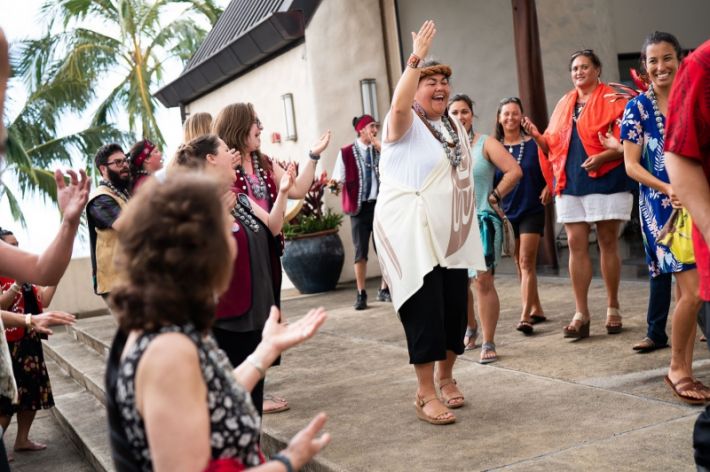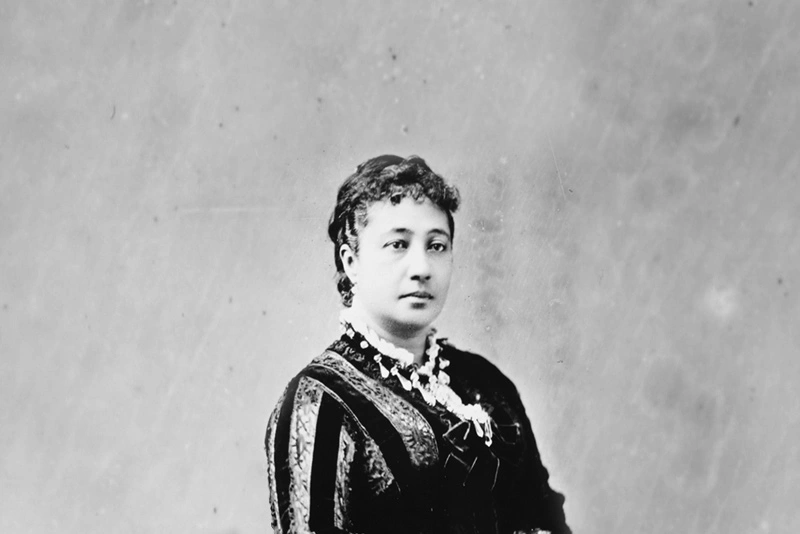Our Kūkahekahe cultural conversations column concludes its celebration of National Women’s History Month by highlighting two meʻe wahine (women heroes) from Alaska who recently shared a conversation with KS about reclaiming their mother tongue, the importance of their people’s matrilineal traditions, and what it means to be a leader in their communities. To learn about more meʻe wāhine, follow Kaʻiwakīloumoku on Instagram and Facebook!
It isn’t a coincidence that the term “mother tongue” is often used to refer to the first language spoken in one’s childhood. Women have important roles in the preservation of cultures and languages within families and communities. In matrilineal cultures, like those of Alaska Natives, women are primarily responsible for carrying these treasured elements of identity forward.
The vast geography that makes up Alaska and parts of Canada today helped to shape the development of unique cultures and languages among the original peoples. The diverse indigenous peoples of Alaska are collectively known as Alaska Natives, most of whom are part of 231 U.S. Federally Recognized Tribes, with more than twenty unique cultural groups and distinct languages.
There are five major groupings of Alaska Natives based on linguistic and cultural similarities: Aleuts, Northern Eskimos (Inupiat), Southern Eskimos (Yuit), Interior Indians (Athabascans), and Southeast Coastal Indians (Tlingit, Haida, and Tsimshian).
“Our lineages are matrilineal, and our societies are matriarchal. Your identity is from your mother, from her mother, from her mother, and from her mother, handed down through thousands of generations,” acknowledges La quen náay Liz Medicine Crow (Haida/Tlingit). “To be the stewards of a lineage means that our actions need to lift up our people and lift up our clan. We get to be the personification of something that is ancient by carrying a clan name and living into that legacy.”
‘Wáahlaal Gíidaak Barbara Blake (Haida/Tlingit/Ahtna Athabascan) agrees. “Our clan stops with my brother but carries forward with me. The responsibilities I have on my shoulders date back thousands of years; my brother’s children won’t carry his clan.”
La quen náay is CEO and president of the First Alaskans Institute, a nonprofit organization that aims to develop the capacities of Alaska Native people to meet the social, economic and educational challenges of the future. ‘Wáahlaal Gíidaak is the Alaska Native policy director for the same organization.
La quen náay and ‘Wáahlaal Gíidaak are both learners of their mother tongues, Tlingit and Haida. Both languages are extremely endangered with few elders and native speakers. The decades-long race to preserve languages in their communities is mirroring the same struggles that have occurred in Hawaiʻi and places like Aotearoa, though many would consider the recovery of these languages more dire because of the small number of native speakers and the scope of trauma that has occurred to Alaska Native people as a result of colonization.
Generations of stigma around speaking native languages, practicing native culture, and even being native in Alaska has created huge obstacles to learning. ‘Wáahlaal Gíidaak reflects, “There was a time when it was looked down on to speak your language…we have to unburden ourselves of that stigma. It takes a lot of work to lift that off of our shoulders before we can be free to speak.”
“When I’m around my Hawaiian brothers and sisters, I can pick up what you’re saying... Same with our Māori brothers and sisters,” La quen náay shares. “But when it comes to learning my own languages, I have to walk through a field of pain. Whenever I used to try to speak and introduce myself, I would have it in my mind that I was going to start off with my language, and as soon as I opened my mouth, English would come out. And I would walk away feeling ashamed of myself, feeling guilty. And it would compound that distance and that hurt.”
Both women emphasize the role that healing has in language recovery and reclamation; because above all learning and teaching language is about love. A breakthrough for La quen náay came when she and a small group of women set up a language immersion weekend with a Tlingit teacher in the community.
“Being on our lands, eating our foods, laughing and being together, and being immersed in the language… all of a sudden all of those things that held me back before, dissolved. I started off with a little cheat book, with my introduction written down, and I told myself I would use it as long as I needed it. And pretty soon I just didn’t need it anymore,” she smiles.
La quen náay shared the metaphor of a child waking up hungry after a long sleep and a question of what to feed them posited by a Yupik elder. “The first signal that someone is recovering from an illness is that their appetite has returned. We are actively healing now and making space for our children to be waking up hungry,” she says. “And it takes so much work, but it’s the good kind of work, it’s hard work, its emotional, because it is about healing. Our languages are medicine for us.”
‘Wáahlaal Gíidaak similarly acknowledges the power language has had in reclaiming her mother tongue for herself and her clan. “The first few times that I spoke our language in public, my voice trembled because I could feel the power of our ancestors bursting through and being present in the room. And it made a difference in who I was and in my ability to stand up.
“I see it in my children and in their ability to stand tall when they are speaking their language. They get to be born in this system of being proud of who they are and having their ancestors lift them up, carrying them on their shoulders.”
To listen to the entire conversation, visit “Offshoot Commentaries: Alaska Native Matriarchal Power” on the Kaʻiwakīloumoku website!

First Alaskans Institute President and CEO La quen náay Liz Medicine Crow at the 2019 Hoʻoilina Conference at the Kaʻiwakīloumoku Hawaiian Cultural Center, hosted by the ʻAha Moananuiākea Pacific Consortium.
TAGS
kūkahekahe,pacific conversations,women's history month,alaska,language,aha moananuiākea pacific consortium
CATEGORIES
Kaipuolono Article, Regions, Themes, Culture, Community, Hawaii Newsroom, KS Hawaii Home, Kapalama Newsroom, Kapalama Home, Maui Newsroom, KS Maui Home, Newsroom, Campus Programs, Hawaii, Kapalama, Maui, Community Education, Department News
Print with photos
Print text only










